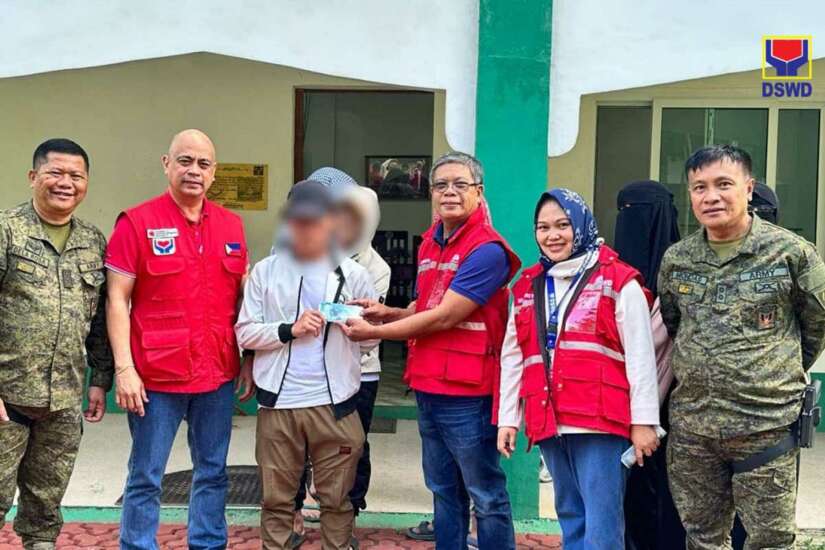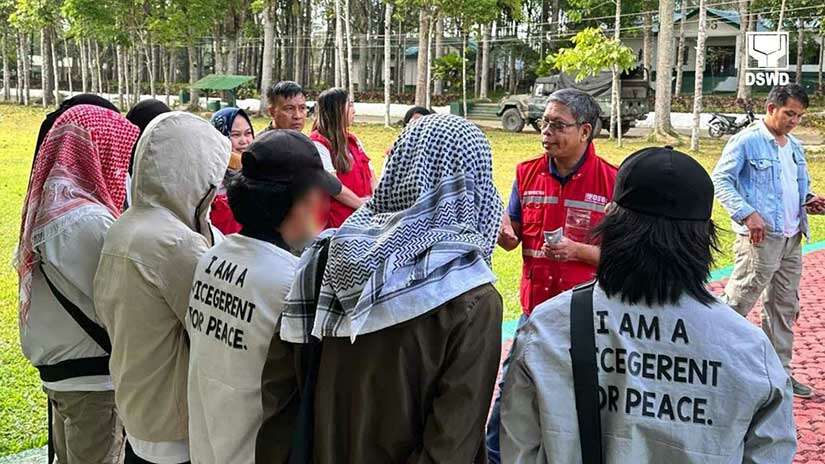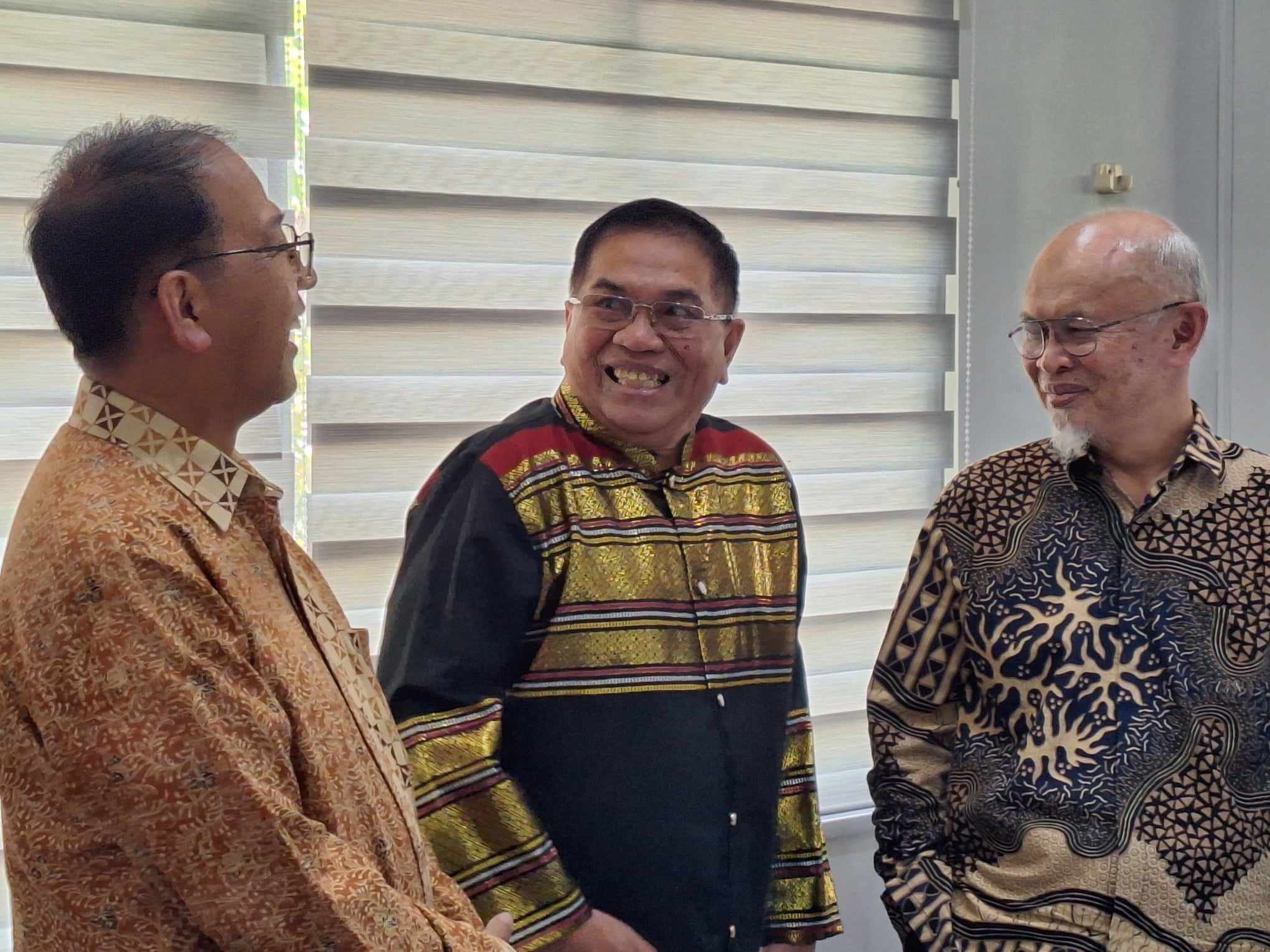From the Journal Online (Mar 26, 2024): DSWD execs hold dialogue with ex-Dawlah Islamiyah members to improve peace and development programs

DSWD Undersecretary for Inclusive-Sustainable Peace and Special Concerns Alan Tanjusay hands over financial aid to an ex-member of Dawlah Islamiyah through the agency’s Assistance to Individuals in Crisis Situation (AICS) program, during a dialogue held in Marawi City, Lanao del Sur from March 19 to 20. Usec. Tanjusay said the Marawi City dialogue was the third leg of the DSWD’s benchmarking study on former combatants of non-state armed groups to improve its case management strategy for peace and development.
Department of Social Welfare and Development (DSWD) officials led by Undersecretary for Inclusive-Sustainable Peace and Special Concerns (ISPSC) Alan Tanjusay has conducted a dialogue with former members of the Dawlah Islamiyah in Marawi City, Lanao del Sur from March 19 to 20 as part of their efforts to improve the agency’s peace and development programs.
“The focus group discussions and interviews with ex-members of the non-state armed group are part of DSWD’s continuing efforts to enhance the case management strategy for peace and development through a series of field visits and benchmarking activities,” Usec. Tanjusay said on Tuesday (March 26).
“These series of activities are based on the directive of Secretary Rex Gatchalian for the Department to identify effective ways to provide psychosocial interventions for long-term behavioral outcomes of ex-combatants instead of short-term cash assistance only,” he said.
Tanjusay said the DSWD team met with adult ex-members who had been recruited as children by the Dawlah Islamiyah, as well as with young widows of the armed group’s commanders who were killed in clashes with government troops.
Department of Social Welfare and Development (DSWD) officials led by Undersecretary for Inclusive-Sustainable Peace and Special Concerns (ISPSC) Alan Tanjusay has conducted a dialogue with former members of the Dawlah Islamiyah in Marawi City, Lanao del Sur from March 19 to 20 as part of their efforts to improve the agency’s peace and development programs.
“The focus group discussions and interviews with ex-members of the non-state armed group are part of DSWD’s continuing efforts to enhance the case management strategy for peace and development through a series of field visits and benchmarking activities,” Usec. Tanjusay said on Tuesday (March 26).
“These series of activities are based on the directive of Secretary Rex Gatchalian for the Department to identify effective ways to provide psychosocial interventions for long-term behavioral outcomes of ex-combatants instead of short-term cash assistance only,” he said.
Tanjusay said the DSWD team met with adult ex-members who had been recruited as children by the Dawlah Islamiyah, as well as with young widows of the armed group’s commanders who were killed in clashes with government troops.

Department of Social Welfare and Development (DSWD) officials led by Undersecretary for Inclusive-Sustainable Peace and Special Concerns Alan Tanjusay engage former members of the Dawlah Islamiyah in a dialogue held in Marawi City, Lanao del Sur from March 19 to 20. Usec. Tanjusay said the series of field visits and dialogues with ex-members of the non-state armed group are part of DSWD’s continuing efforts to enhance the case management strategy for peace and development.
“The goal of the activity is to gather inputs from those directly involved, and package these into a module that can help social workers and other professionals provide better services to children and women in armed conflict,” he said.
“Through the dialogue, we want to identify the factors that pushed them to engage in violent extremism at such a young age and know how their combat experience affected them. After the discussion, the DSWD team also debriefed the respondents following the protocols of ethical research involving human subjects,” the DSWD official said.
The former Dawlah Islamiyah members also received cash aid through the agency’s Assistance to Individuals in Crisis Situation (AICS) program.
Usec. Tanjusay said the dialogue with former Dawlah Islamiyah members was the third leg of the DSWD’s benchmarking study on former combatants of non-state armed groups to improve its case management strategy for peace and development.
Earlier, the DSWD team visited conflict-affected communities in Sulu, where the Abu Sayyaf Group used to operate; and interviewed former members of the Cordillera Bodong Administration-Cordillera People’s Liberation Army (CBA-CPLA), a CPP-NPA breakaway group in Mt. Province.
Joining Usec. Tanjusay during the dialogue were DSWD Field Office-10 (Northern Mindanao) Assistant Regional Director for Operations Ronald Cui, Assistant Regional Director for Administration Salmah Basher, and peace and development focal persons.
“The goal of the activity is to gather inputs from those directly involved, and package these into a module that can help social workers and other professionals provide better services to children and women in armed conflict,” he said.
“Through the dialogue, we want to identify the factors that pushed them to engage in violent extremism at such a young age and know how their combat experience affected them. After the discussion, the DSWD team also debriefed the respondents following the protocols of ethical research involving human subjects,” the DSWD official said.
The former Dawlah Islamiyah members also received cash aid through the agency’s Assistance to Individuals in Crisis Situation (AICS) program.
Usec. Tanjusay said the dialogue with former Dawlah Islamiyah members was the third leg of the DSWD’s benchmarking study on former combatants of non-state armed groups to improve its case management strategy for peace and development.
Earlier, the DSWD team visited conflict-affected communities in Sulu, where the Abu Sayyaf Group used to operate; and interviewed former members of the Cordillera Bodong Administration-Cordillera People’s Liberation Army (CBA-CPLA), a CPP-NPA breakaway group in Mt. Province.
Joining Usec. Tanjusay during the dialogue were DSWD Field Office-10 (Northern Mindanao) Assistant Regional Director for Operations Ronald Cui, Assistant Regional Director for Administration Salmah Basher, and peace and development focal persons.
https://journal.com.ph/dswd-execs-hold-dialogue-with-ex-dawlah-islamiyah-members-to-improve-peace-and-development-programs/


